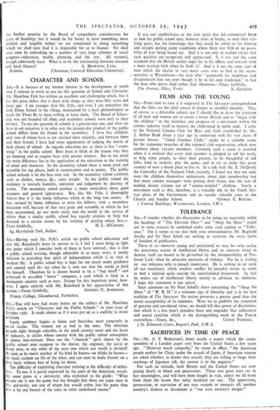CHARACTER AND SCHOOL
suz,—It is because of my intense interest in the development of youth that I venture to write to you on this question of School and Character. Mr. Hamilton Fyfe has written an excellent and challenging article, but it has this great defect that it deals with things as they were fifty years and more ago. I am younger than Mr. Fyfe, and even I can remember the little Dame School in the village, maintained by a local philanthropist to teach the Three Rs to those willing to learn them. The Board of Educa- tion was not founded till 1899, and secondary schools were only in their infancy. To me the question of schools is a present-day one, and what we have to ask ourselves is in what way the present-day product of the public school differs from his friend in the secondary. I have five children, only two of whom have as yet attained their majority, and between them and their friends I have had some opportunity of judging the merits of both classes of school. As regards education per se there is less '' cram- ming " in the public school. Boys learn to think of the reason why they are learning and so acquire facts with greater interest. But to my mind the main difference lies in the application of the education to the training of mind and character. In the secondary school there is more push and scramble for top places, both in examinations and in games. The public school attitude is let the best man win. In the secondary school externals such as clothes, money, &c., carry weight. In the public school the tendency is towards humility, toleration and judgement by decency of action. The secondary school product is more meticulous about good manners and general appearance. But, like Mr. Fyfe, I thoroughly _ believe that it is the home influence which in the long run counts.
boy, trained by home influence to serve his fellows, with a secondary education will, because of that very push and scramble to which he has been accustomed, go out more easily into the world in the service of others than a similar public school boy equally anxious to help but deterred to a certain extent by his training of putting others first.—


























 Previous page
Previous page